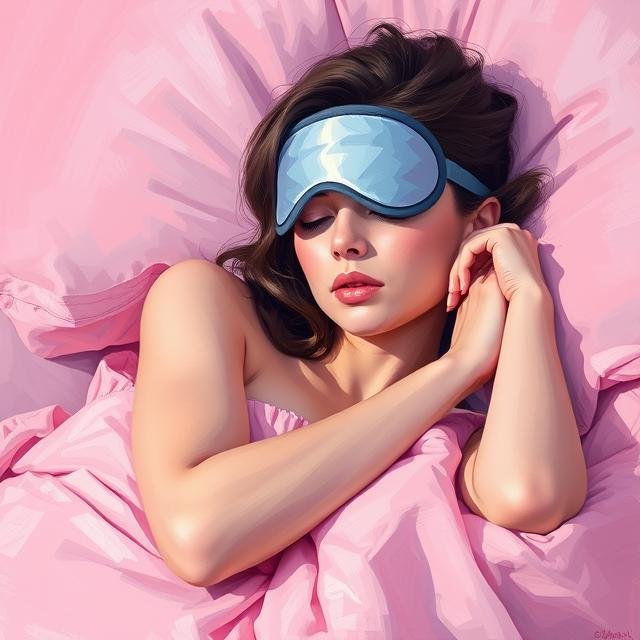In our quest for a perfect night’s sleep, many of us have tried all sorts of tricks, from counting sheep to sipping herbal tea. One simple tool that often comes up is the humble sleep mask. But do sleep masks improve sleep in a meaningful way? Can wearing an eye mask for sleeping genuinely enhance your rest, or is it just a fad? This guide will delve into whether sleep masks improve sleep quality, explore the science behind them, and weigh the pros and cons to help you decide if this popular sleep aid is right for you.
- What Exactly is a Sleep Mask and How is it Supposed to Work?
- The Big Question: Do Sleep Masks Improve Sleep Quality? Exploring the Pros
- Are There Any Downsides? Potential Cons of Using a Sleep Mask
- Types of Sleep Masks: Finding Your Perfect Match
- How to Choose the Right Sleep Mask for You
- Tips for Getting the Most Out of Your Sleep Mask
- Who Might Benefit Most from Using a Sleep Mask?
- Comparing Sleep Mask Features: A Quick Guide
- Alternative Strategies if a Sleep Mask Isn’t For You
- Final Thoughts: Do Sleep Masks Improve Sleep? The Verdict
- FAQs: Your Sleep Mask Questions Answered
- References
What Exactly is a Sleep Mask and How is it Supposed to Work?
A sleep mask, also known as an eye mask for sleeping, is a covering worn over your eyes to block out ambient light. The basic idea is pretty simple: by creating an environment of complete darkness, sleep masks aim to make it easier for you to fall asleep and stay asleep, contributing to better rest.
The Science Bit: Light, Melatonin, and Your Sleep Cycle
Understanding how light affects our sleep is key to understanding the potential benefits of sleep masks.
- Melatonin Production: Our bodies produce a hormone called melatonin, which signals to our brain that it’s time to sleep. Melatonin production is highly sensitive to light; darkness stimulates its release, while light suppresses it.
- Circadian Rhythm: Light is the primary cue for our internal body clock, or circadian rhythm, which regulates our sleep-wake cycles. Exposure to light at night can disrupt this rhythm.
- A Sleep Mask’s Role: By effectively blocking light, a sleep mask helps create the dark conditions conducive to optimal melatonin production and a healthy circadian rhythm, which are important aspects of good sleep hygiene.
So, Does Sleep Mask Improve Sleep by Tricking Your Brain?
In a way, yes! A sleep mask helps simulate nighttime darkness, even if your room isn’t perfectly dark or if you need to sleep during the day (hello, shift workers!). This “trick” can encourage your brain to wind down and prepare for sleep.
The Big Question: Do Sleep Masks Improve Sleep Quality? Exploring the Pros
Many people swear by their sleep masks. Let’s look at the potential benefits and why they might be on to something.
Enhanced Melatonin Production for Faster Sleep Onset
As mentioned, light blocking is a sleep mask’s superpower. By creating darkness, it can help your body produce melatonin more effectively, potentially helping you fall asleep faster.
Improved Sleep Quality and Duration
By minimizing light-based sleep disturbances, sleep masks can lead to more uninterrupted sleep. This means fewer awakenings during the night, potentially leading to an increase in overall sleep duration and more time spent in deeper, restorative sleep stages, including REM sleep.
A Great Tool for Travelers and Shift Workers
- Travel Sleep: Whether you’re on a plane, train, or in an unfamiliar hotel room with pesky light leaks, a sleep mask can be a traveler’s best friend for creating a consistent sleep environment.
- Shift Workers Sleep: For those who need to sleep during daylight hours, a blackout mask can be invaluable in creating the necessary darkness for quality rest.
Protection Against Unavoidable Light
Sometimes, you can’t control your light environment – maybe your partner reads in bed, or streetlights shine through your curtains. A sleep mask offers a personal light-blocking solution.
Potential Reduction in Insomnia Symptoms
For some individuals whose insomnia symptoms are exacerbated by light sensitivity or an inconsistent sleep schedule, a sleep mask can be a helpful, non-pharmacological sleep aid alternative.
Are There Any Downsides? Potential Cons of Using a Sleep Mask
While there are many sleep benefits, sleep masks aren’t for everyone, and there can be a few drawbacks.
Comfort and Fit Issues
Finding a comfortable sleep mask that fits well can be a challenge.
- Too Tight: Can cause pressure on the eyes or leave marks.
- Too Loose: Might slip off during the night or not block light effectively.
- Material Discomfort: Some materials might feel itchy, hot, or cause skin irritation for sensitive individuals.
Getting Used to Wearing One
It can take some time to adjust to the sensation of wearing something on your face while you sleep. Some people might initially find it distracting.
Potential for Skin Irritation or Acne
If not cleaned regularly, sleep masks can accumulate oils, sweat, and bacteria, potentially leading to skin irritation or acne breakouts around the eyes.
Dependency Concerns (Minor)
While not a true physical dependency, some people might find it harder to sleep without their mask once they get used to it, especially in less-than-dark environments. However, this is often outweighed by the improved sleep they experience.
Types of Sleep Masks: Finding Your Perfect Match
Not all sleep masks are created equal! Here’s a look at some common types:
- Simple Fabric Masks: Often made of cotton or polyester, these are usually affordable and lightweight. Their light-blocking ability can vary.
- Silk Sleep Masks: Known for being gentle on the skin and hair, silk sleep mask benefits include reduced friction and a luxurious feel. They are often good at blocking light.
- Contoured (Molded) Sleep Masks: These have indents for your eyes, so the mask doesn’t press directly on your eyelids. This allows for REM sleep without your eyelashes brushing against the fabric and can be more comfortable for some.
- Weighted Sleep Masks: These apply gentle pressure around the eyes, which some people find calming and sleep-inducing, similar to a weighted blanket.
- Cooling/Warming Masks: Some masks can be cooled in the fridge or warmed, offering therapeutic benefits for issues like puffy eyes or sinus pressure, though their primary function isn’t always sleep.
How to Choose the Right Sleep Mask for You
Consider these factors when looking for an eye cover for sleeping:
- Light Blocking Ability: The primary function! Look for masks designed as a blackout mask.
- Comfort and Fit: It should be snug enough to stay on and block light but not uncomfortably tight. Adjustable straps are a plus.
- Material: Choose a breathable, hypoallergenic material if you have sensitive skin. Silk is a popular choice.
- Pressure: Decide if you prefer a mask that lies flat or one that is contoured to avoid pressure on your eyes.
- Maintenance: Check if it’s machine washable or easy to clean by hand.
Tips for Getting the Most Out of Your Sleep Mask
- Clean it Regularly: Wash your sleep mask frequently (as per its instructions) to prevent skin issues.
- Give it Time: If you’re new to sleep masks, allow yourself a few nights to get used to wearing one.
- Combine with Other Sleep Hygiene Practices: A sleep mask works best as part of a holistic approach to improving sleep habits. This includes maintaining a consistent sleep schedule, creating a restful bedroom environment, and managing stress.
Who Might Benefit Most from Using a Sleep Mask?
While anyone can try a sleep mask, certain individuals might find them particularly helpful:
- People sensitive to light.
- Shift workers or those who need to sleep during the day.
- Frequent travelers.
- Individuals whose partners read or use devices in bed.
- People living in urban areas with significant light pollution.
- Those looking for simple, non-medical ways to enhance their sleep quality.
Comparing Sleep Mask Features: A Quick Guide
| Feature | Simple Fabric Mask | Silk Mask | Contoured Mask | Weighted Mask |
|---|---|---|---|---|
| Light Blocking | Variable | Good to Excellent | Excellent | Good to Excellent |
| Comfort | Depends on fit | Very High | High (no eye pressure) | Varies (pressure) |
| Skin-Friendliness | Variable | High | Good | Variable |
| Price Range | Low | Medium to High | Medium | Medium to High |
| Key Advantage | Inexpensive | Gentle on skin | No eye pressure | Calming pressure |
Alternative Strategies if a Sleep Mask Isn’t For You
If a sleep mask just isn’t your cup of tea, there are other things to improve sleep:
- Blackout Curtains: Invest in good quality curtains to make your room as dark as possible.
- Eliminate Light Sources in the Bedroom: Cover or remove electronic devices with standby lights.
- Focus on Other Sleep Hygiene Aspects: Consistent sleep schedule, limiting caffeine, creating a relaxing bedtime routine.
Final Thoughts: Do Sleep Masks Improve Sleep? The Verdict
So, does sleep mask improve sleep? For many people, the answer is yes. By effectively blocking light, sleep masks can help regulate melatonin production, support your circadian rhythm, and lead to fewer sleep disturbances. This can indeed improve sleep quality and duration. While they might not be a magic bullet for everyone, and comfort is key, a good quality sleep mask is a relatively inexpensive and non-invasive tool worth trying if you’re looking for ways to enhance your rest and get more uninterrupted sleep.
FAQs: Your Sleep Mask Questions Answered
Do sleep masks actually help you sleep better?
Can wearing a sleep mask every night be bad for you?
What kind of sleep mask is best for blocking out all light?
Do sleep masks help with REM sleep?
Are there any side effects to using a sleep mask?
References
- Sleep Foundation. (n.d.). Sleep Masks.
https://www.sleepfoundation.org/sleep-aids/sleep-masks - National Sleep Foundation. (n.d.). How To Use Light To Your Advantage.
https://www.thensf.org/how-to-use-light-to-your-advantage/
(Discusses light’s role in sleep). - American Academy of Ophthalmology. (2023, February 10). Are Sleep Masks Good for Your Eyes?
https://www.aao.org/eye-health/ask-ophthalmologist-q/are-sleep-masks-good-your-eyes - Healthline. (n.d.). Do Sleep Masks Really Work?
https://www.healthline.com/health/do-sleep-masks-work - Centers for Disease Control and Prevention (CDC). (n.d.). Tips for Better Sleep.
https://www.cdc.gov/sleep/about_sleep/sleep_hygiene.html
(General sleep hygiene, where light control is key).










